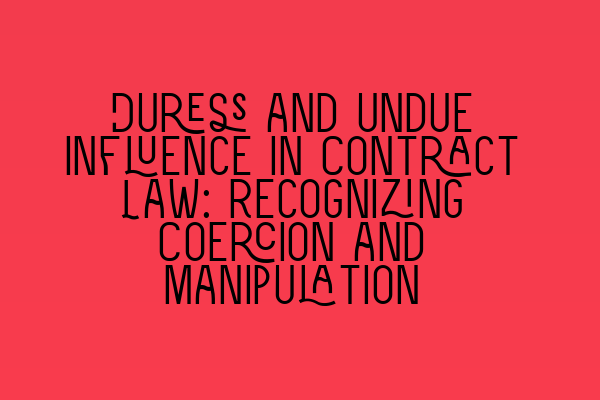Duress and Undue Influence in Contract Law: Recognizing Coercion and Manipulation
Introduction:
In the world of contract law, it is essential to ensure that the parties involved enter into agreements freely and without any form of coercion or manipulation. Contracts are the backbone of business transactions, and upholding their integrity is crucial for a fair and just legal system. This is where the concepts of duress and undue influence come into play. Understanding and recognizing these elements is vital, as they can render a contract voidable or unenforceable. This blog post will delve into the intricacies of duress and undue influence in contract law, shedding light on how coercion and manipulation impact the validity of agreements.
Defining Duress:
Duress refers to the act of unlawfully pressuring or forcing someone into entering a contract against their will. It involves coercive tactics that eliminate an individual’s freedom of choice and compromise their consent. Duress can take various forms, including physical threats, blackmail, economic pressure, or even psychological manipulation. It is important to note that the key aspect of duress is that the victim is left with no reasonable alternative but to enter into the agreement.
Recognizing Duress in Contracts:
When assessing the presence of duress in a contract, several factors are taken into consideration. These include the intensity of the threat, the immediacy of the harm, and the sustainability of the victim’s endurance. Courts analyze whether a reasonable person would have succumbed to the same pressure or threats and evaluate the extent to which the coerced party protested against the terms of the agreement.
Undue Influence:
Undue influence, on the other hand, revolves around situations where one party unfairly exploits their position of power or trust to manipulate the other party’s decision-making process. It involves persuasive tactics that overbear the weaker party’s free will and unduly influence their judgment, leading them to enter into a contract they may not have agreed to under normal circumstances. Unlike duress, undue influence does not always involve direct threats or force.
Identifying Undue Influence in Contracts:
To determine the presence of undue influence, courts examine the relationship between the parties, particularly addressing situations where a special relationship of trust and confidence exists. This could be between a doctor and a patient, an attorney and a client, or even family members. The court will consider whether the stronger party took unfair advantage of the weaker party’s vulnerability and whether the transaction is manifestly disadvantageous to the latter.
Implications of Duress and Undue Influence:
When a contract is found to be tainted by duress or undue influence, it can have significant legal implications. The affected party may seek remedies such as rescission or, in some cases, claim damages. Rescission allows the coerced or manipulated party to be released from their contractual obligations. The goal is to restore the parties to their pre-contractual positions and nullify the contract’s effects. Damages, on the other hand, aim to compensate the victim for any losses suffered due to the coercion or manipulation.
Avoiding Duress and Undue Influence:
To steer clear of duress and undue influence, it is crucial to ensure that contracts are entered into voluntarily and without any elements of coercion or manipulation. Parties should engage in fair negotiations, provide disclosure of all pertinent information, and seek independent legal advice if necessary. Proper documentation, maintaining transparency, and upholding ethical practices can go a long way in safeguarding the integrity of contracts.
Conclusion:
Duress and undue influence are essential concepts in contract law that protect individuals from being coerced or manipulated into agreements against their will. Recognizing and understanding these elements is crucial for maintaining the integrity of contracts and ensuring a fair business environment. By being aware of the signs of duress and undue influence and taking steps to avoid them, parties can enter into contracts freely, with full consent, and without fear of exploitation. Upholding the principles of fairness and legality is at the core of contract law, and recognizing the impact of coercion and manipulation is the first step toward achieving this goal.
